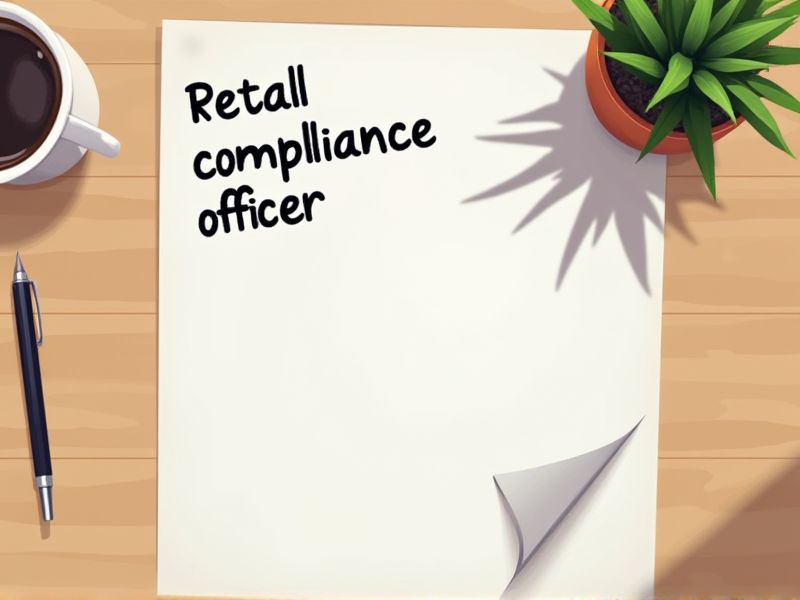
Retail compliance officers are tasked with ensuring that their organizations adhere to industry regulations, which directly affects business operations and legal standing. Certifications provide the necessary expertise to navigate complex regulatory landscapes and mitigate compliance-related risks. They often lead to enhanced credentials, increased trust from stakeholders, and a more competitive position within the industry. Here are some essential certifications needed for a Retail compliance officer.
Certified Regulatory Compliance Manager (CRCM)
A Certified Regulatory Compliance Manager (CRCM) equips retail compliance officers with a specialized understanding of regulatory requirements, enhancing their capability to manage complex compliance landscapes. The credential affirms an officer's expertise in compliance laws and regulations, reducing the risk of non-compliance penalties for retail businesses. Possessing the CRCM designation assures stakeholders of the officer's proficiency, which builds trust and credibility among clients and partners. The certification enhances an officer's decision-making and strategic planning skills, allowing for more effective implementation of compliance programs.
Certified Compliance & Ethics Professional (CCEP)
The Certified Compliance & Ethics Professional (CCEP) credential provides retail compliance officers with specialized knowledge in regulatory requirements, reducing the risk of legal violations. A CCEP-certified officer demonstrates a commitment to upholding ethical standards, fostering trust with both consumers and regulators. By holding a CCEP designation, retail compliance officers enhance their ability to create and implement effective compliance programs tailored to industry-specific challenges. The certification equips officers with the skills needed to promptly identify and address potential compliance issues, minimizing reputational and financial damage to the organization.
Certified Fraud Examiner (CFE)
Retail environments often face complex fraud scenarios, and hiring a Certified Fraud Examiner (CFE) can boost early detection and prevention measures. CFEs bring specialized knowledge in fraud risk assessment, effectively reducing potential financial losses. They provide insights into compliance with legal and regulatory frameworks, enhancing the organization's integrity. Their expertise aids in designing robust internal controls, ensuring efficient retail operations and protecting company assets.
Certified Anti-Money Laundering Specialist (CAMS)
Retail environments face a high risk of money laundering activities due to the vast number of transactions and customer interactions. A Certified Anti-Money Laundering Specialist (CAMS) equips retail compliance officers with the necessary skills to detect and prevent illicit financial activities. CAMS certification ensures that officers stay updated with the latest regulatory requirements and best practices in anti-money laundering. Enhanced compliance reduces potential legal liabilities and bolsters the organization's reputation for integrity.
Certified Risk and Compliance Management Professional (CRCMP)
Retail compliance officers face increasingly complex regulatory environments, making the CRCMP certification crucial for expertise in navigating these challenges. The certification demonstrates a comprehensive understanding of risk management frameworks, which is essential for effectively overseeing retail compliance. Retailers benefit from CRCMP-certified professionals by ensuring adherence to legal standards, minimizing potential liabilities. Moreover, the certification signals a commitment to industry best practices, enhancing the organization's reputation and trustworthiness in the marketplace.
Certified Internal Auditor (CIA)
The Certified Internal Auditor (CIA) designation equips a retail compliance officer with a deep understanding of internal controls, ensuring businesses adhere to regulatory standards. This expertise aids in identifying and mitigating risks, thus safeguarding a retailer's financial health and reputation. The comprehensive knowledge gained through the CIA program enhances a compliance officer's ability to develop and implement effective compliance frameworks. With a CIA-certified officer, retail companies benefit from improved operational efficiencies and reduced chances of financial misconduct.
Certified Information Systems Auditor (CISA)
Retail compliance officers need to ensure adherence to industry standards, and a Certified Information Systems Auditor (CISA) equips them with knowledge to assess IT controls effectively. E-commerce integration in retail heightens cybersecurity risks; CISA certification provides the expertise to evaluate and mitigate potential threats. Regulatory requirements often mandate periodic audits, and CISA-trained professionals can conduct these audits, ensuring accuracy and compliance. As digital payment systems become prevalent, CISA skills help in safeguarding transactional data, protecting consumer interests, and maintaining trust.
Certified Ethics & Compliance Officer (CECO)
Retail environments involve complex regulations that are constantly evolving, creating a demand for specialized expertise in ethics and compliance. A Certified Ethics & Compliance Officer (CECO) ensures that the company's practices align with legal standards and ethical norms, reducing the risk of violations and associated penalties. The CECO's role involves embedding a culture of compliance within the organization, which helps in fostering customer trust and protecting the brand's reputation. With their guidance, retail businesses can effectively navigate compliance challenges, thereby enhancing operational efficiency and sustainability.
FINRA Series 7 & Series 63 Certifications
A retail compliance officer must understand complex financial products and regulations, which is why the FINRA Series 7 certification is necessary. This certification ensures they comprehend product-specific rules essential for advising and overseeing broker-dealer operations. The Series 63 certification, on the other hand, demonstrates knowledge of state securities laws, which is crucial for ensuring compliance with local regulations. By obtaining both certifications, a retail compliance officer can effectively navigate and manage the regulatory landscape, reducing legal risks for the firm.
ISO 9001 Lead Auditor Certification
Obtaining the ISO 9001 Lead Auditor Certification equips a retail compliance officer with the skills to evaluate and improve quality management systems, ensuring adherence to international standards. Increased regulatory scrutiny in the retail industry demands precise auditing skills, which this certification provides. A retail compliance officer with such certification can enhance the organization's credibility and customer trust, vital for competitive advantage. Companies often seek certified individuals to mitigate risk and maintain consistent quality, aligning business operations with strategic goals.
Summary
By obtaining certifications, you enhance your credibility and expertise within the retail sector. This often leads to improved job performance and a more refined understanding of compliance regulations. You may see increased career prospects, as certifications are valued by employers. Certifications can also facilitate better communication and rapport with colleagues and stakeholders due to your enhanced skill set.
